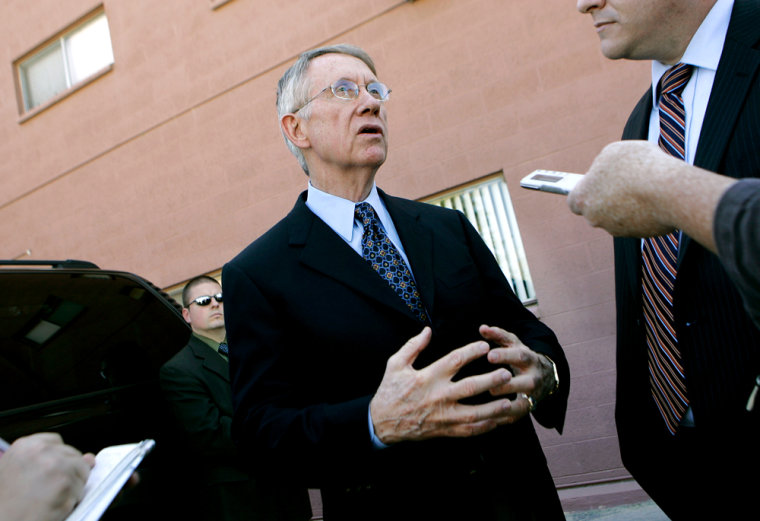Trying to dispel the image of a corrupt Congress, the Senate has made it easier to spot special-interest items in legislation and is considering tougher ethics rules for lawmakers.
Majority Democrats and minority Republicans lauded a 98-0 vote Tuesday to require lawmakers to disclose the special projects, or "earmarks," they tuck into spending bills. The change was added to ethics and lobbying legislation.
The outcome "demonstrates that we can work together to achieve meaningful results," said Sen. Jim DeMint, R-S.C., who pushed for comprehensive changes in how the Senate deals with earmarks.
Major ethics issues still undecided
Rob Portman, head of the White House Office of Management and Budget, commended Congress for moving to "pave the way for greater transparency and accountability in the congressional budget process."
Senate Majority Leader Harry Reid, D-Nev., made the ethics and lobbying overhaul his first order of business as head of the Senate. He wants a final vote by week's end so the Senate can move on to other Democratic priorities, including a raise in the minimum wage.
To do that, several major issues must still be dealt with.
The Senate voted Tuesday to advance debate on a Reid amendment that would end the practice of senators paying the equivalent of a first-class ticket when they catch rides on corporate jets. Instead, they would have to pay the considerably more costly rate to hire a charter plane.
Concern for lobbying groups
Several senators, including possible presidential candidates John McCain, R-Ariz., and Barack Obama, D-Ill., are pushing for creation of an independent office of public integrity that would relieve the Senate ethics committee of some of its investigative duties.
There's also expected to be a fight over an effort to strike from the bill language requiring more disclosure on grassroots lobbying, or paid efforts to influence the general public on an issue.
Many conservative groups are opposed to the provision, saying it would place onerous reporting duties on advocacy groups.
The definition of earmarks
The unanimous vote on the earmarks issue came just days after Reid unsuccessfully tried to defeat DeMint's effort to broaden the definition of earmark. On Tuesday, he said the final product "combined the best ideas from both sides of the aisle."
DeMint last week proposed that the Senate use the House's more expansive definition of an earmark. Under that meaning, earmarks subject to public disclosure would include special projects tucked in federal agency budgets, such as a Pentagon contract, as well as nonfederal projects such as state parks and municipal museums. The definition in the original Senate bill would have applied only to nonfederal entities.
Sen. Tom Coburn, R-Okla. said the Democratic approach would catch less than 5 percent of the almost 13,000 earmarks that made it into legislation last year.
The Senate first voted 98-0 to accept changes to the DeMint amendment offered by Senate Majority Whip Dick Durbin, D-Ill., that would make it more difficult for legislators to slip in tax breaks that help a single company or a limited number of people.
Lawmakers would also be required to post their earmarks on the Internet 48 hours before a vote.
The Senate on Tuesday also approved, by voice vote, an amendment that would bar lawmakers from including earmarks in the classified parts of a bill or a conference report without language in unclassified terms describing the project, funding levels and the sponsor.
Sen. Dianne Feinstein, D-Calif., sponsor of the amendment with Sen. Jay Rockefeller, D-W.Va., said former Rep. Randy "Duke" Cunningham, R-Calif., now serving an eight-year prison term for accepting bribes from defense contractors, over a five-year period used classified reports to gain some $70 million to $80 million in earmarks that helped his friends.
The bill is S.1.
